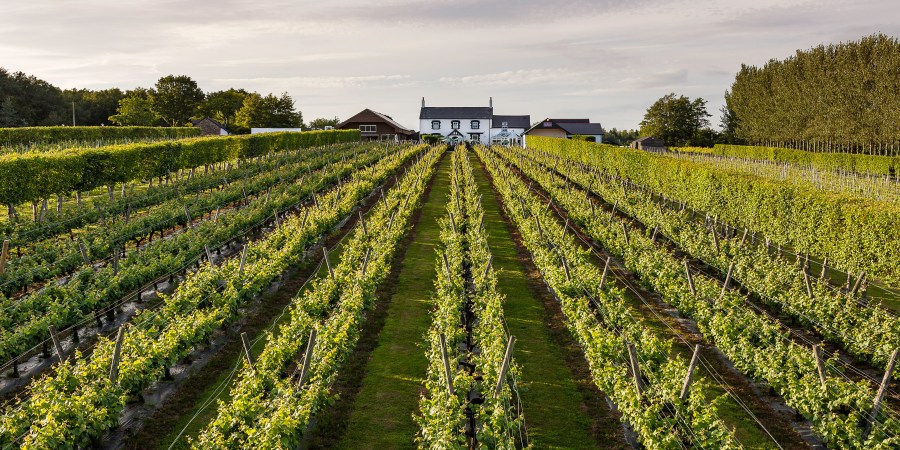Later this week, Welsh vineyards and wine producers will be welcoming guests from Wales and beyond to taste what its flourishing wine sector has to offer during the annual Welsh Wine Week.
Now in its third year and taking place from the 2-11 June, events, guided tours and promotions will be held to give wine lovers the chance to discover Wales’ picturesque vineyards and sample the wide range of award-winning wines.
Welsh Wine Week is organised by the Welsh Drinks Cluster, funded by the Welsh Government, which works in partnership with drinks producers and vineyards to promote the industry and its production of world-class products.
Welsh Government Minister for Rural Affairs, North Wales and Trefnydd, Lesley Griffiths, said: “The Welsh wine industry continues to thrive and has tremendous potential to build on what has already been achieved. More and more people each year can enjoy the wonderful flavours of Wales by attending events linked with the week.
“It’s fantastic to see the Welsh wine industry growing so much and becoming an increasingly important part of both the food and drink and visitor economy. I wish everyone taking part a very successful event as our country’s exceptional wine offering is celebrated and goes from strength to strength.”
With almost 40 vineyards now operating across the country, Wales’ credibility as an innovative producer of high-quality wine has blossomed thanks to its pioneering vineyard owners, the fantastic fruit that is grown as well as Wales’ distinctive landscape and microclimate. There are over 20 different grape varieties grown, producing exceptional red, white, rosé and sparkling wines.
Robb Merchant, owner of White Castle Vineyard, said: “The Welsh wine industry has been growing over the past 10 years, with now close to 40 vineyards. It is becoming an integral part of the Welsh economy.
“Firstly is the employment opportunities that are being created as we see established vineyards growing and new larger plantings being planned. Secondly, there is the tourism aspect, those vineyards that are open to visitors are creating some great opportunities for tourists to visit and tour, learn about the growing process and then taste and learn about the wines they produce. Many are now becoming a primary destination for visitors. The third part in this equation is the support that is being given by the trade stockists, restaurants, shops and hotels across Wales, and the rest of the UK. There is a real demand for Welsh wine across the UK.”
Recently, a first-of-its-kind strategy was launched to set the future of the Welsh wine industry into focus over the next twelve years and increase the sector’s current value by 10-fold to reach £100 million by 2035.
Developed at a pivotal time for Welsh vineyards, with the support of the Welsh Government’s Drinks Cluster, the industry-led strategy is designed to ensure Wales builds on its emerging reputation as an experimental producer of varying wines, following some impressive successes in recent years that have been rewarded with a number of international awards.
Key to the strategy is the industry’s determination to embed an ethos of fair work and sustainability at its core. A good example of this can be found in a collaborative project featuring Ancre Hill Estates, Gwinllan Conwy Vineyard, Gwinllan Hebron Vineyard and Sticle Vineyard that is looking to decarbonise and improve the efficiency of Welsh vineyards through reducing the use of synthetic chemicals.
Supported by the Welsh Government’s Decarbonisation and Covid Challenge Fund, the project’s objective was to increase knowledge and understanding of disease control and prevention methods in vineyards across Wales. The project’s outputs will help to reduce future use of, and reliance on, synthetic chemicals.
Fintan O’Leary, Managing Director of Levercliff who deliver the Welsh Drinks Cluster on behalf of the Welsh Government, commented: “The strategy is a real collaborative effort by the vineyards themselves over a number of years and sets out a clear vision for the industry’s future potential and how that vision will be delivered.
“One of the core aims is to encourage vineyards and industry stakeholders to explore their Welsh provenance further, as it is the microclimates and landscapes that puts Wales in the advantageous position of producing award-winning wines, all of which have led to global recognition for many vineyards across the county and there is definitely potential to expand on this further.”
The new strategy highlights Wales’ achievements over the past year, including Welsh wine sales which, alongside English wine, increased by 31.3% to 9.3 million bottles in 2021.
It also outlines five strategic pillars as paving the future for Welsh wine. These include a strong online presence, organisation, skills, wine tourism and Welsh wine identity and brand. By exploring these five key pillars further, Welsh wine experts predict from past success that wine sales and revenue from cellar door activities, including wine tasting events, vineyard tours and overnight experiences will bring in a revenue of £14.4 million by 2035.
The tourism impact on Welsh GDP, partnered with Welsh wine’s popular growth is predicted to bring in a further £75.9 million by 2035.
For more information on Welsh Wine Week, visit www.welshwineweek.co.uk

Llanerch




